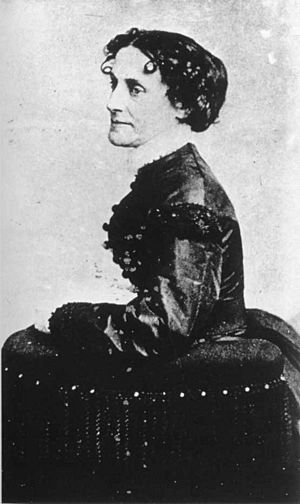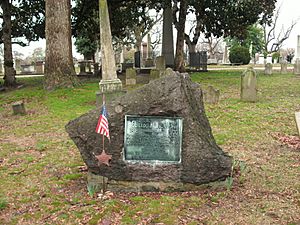Elizabeth Van Lew facts for kids
Quick facts for kids
Elizabeth Van Lew
|
|
|---|---|
 |
|
| Born | October 12, 1818 |
| Died | September 25, 1900 (aged 81) Richmond, Virginia
|
| Resting place | Shockoe Hill Cemetery |
| Nationality | American |
| Known for | Espionage during the American Civil War |
Elizabeth Van Lew (born October 12, 1818 – died September 25, 1900) was an amazing American woman. She worked secretly as a spy for the Union Army during the American Civil War. She was also an abolitionist, meaning she was against slavery.
Contents
Early Life and Anti-Slavery Views
Elizabeth Van Lew was born in Richmond, Virginia, on October 12, 1818. Her parents were John Van Lew and Eliza Baker. Her father owned a successful hardware business. He also owned several enslaved people.
Elizabeth went to school in Philadelphia. She attended a Quaker school. This school likely helped her form strong anti-slavery beliefs. After her father died in 1843, Elizabeth and her mother lived in their family home.
Even though her family owned slaves, Elizabeth and her mother helped them. They helped the enslaved people in their home earn money. They also helped them gain some freedom. Elizabeth hoped that slavery would end peacefully. She believed that Southerners would free their slaves over time.
Elizabeth Van Lew's Civil War Espionage
When the American Civil War began, Elizabeth and her mother helped the Union side. They cared for wounded soldiers. When Libby Prison opened in Richmond, Elizabeth was allowed to visit. This prison held Union soldiers.
Elizabeth brought food, clothes, and paper to the prisoners. She even helped them try to escape. She gave them information about safe places. She also helped a Union supporter get a job at the prison. Elizabeth reportedly gave money to prisoners. This money was used to bribe Confederate guards.
Gathering Secret Information
Recently captured prisoners gave Elizabeth important information. They told her about Confederate troop numbers and movements. She then passed this information to Union commanders. It is said that she hid escaped Union prisoners in her own home. She might have also hidden Confederate soldiers who left the army. However, there is no clear proof of this.
Elizabeth also ran a spy network during the war. This network included clerks who worked for the Confederacy. It also included free and enslaved African Americans. One important spy was Mary Richards Bowser. Mary was likely a formerly enslaved maid in the Van Lew household. The Van Lew family sent her to a Quaker school in Pennsylvania.
Stories say Mary Bowser worked as a maid for Confederate President Jefferson Davis. While there, she supposedly spied for the Union. She herself said she worked as a detective during the war.
Working with General Grant
Elizabeth Van Lew's spy network was very effective. She even sent Union Lt. Gen. Ulysses S. Grant fresh flowers from her garden. She also sent him copies of the Richmond newspaper. She created a secret code system. She often hid messages inside hollow eggs to smuggle them out of Richmond.
Union commanders greatly valued Elizabeth's work. General George H. Sharpe, a Union intelligence leader, praised her efforts. He suggested the government pay her back $15,000. This was because she spent a lot of her own money on spying. General Grant was so impressed that he made her the Postmaster General of Richmond. She held this job for eight years.
In 1864, Elizabeth risked her entire spy network. She wanted to make sure Union Col. Ulric Dahlgren was properly buried. He died trying to free Union prisoners in Richmond. Reports said his body was treated badly. This angered people in the North, including Elizabeth. After the long siege of Petersburg, Elizabeth also helped regular people from both sides.
Life After the War
When Union forces took Richmond in April 1865, Elizabeth was the first to raise the United States flag in the city.
When General Grant first visited Richmond after the war, he had tea with Elizabeth. Later, he appointed her postmaster of Richmond. Elizabeth modernized the city's postal system. She hired several African Americans. They received the same pay and benefits as white employees. However, new President Rutherford B. Hayes replaced her in 1877. She was allowed to return as a postal clerk in Richmond from 1883 to 1887.
After the Reconstruction period, Elizabeth became less popular in Richmond. She wrote that "No one will walk with us on the street." She felt more and more alone as years passed. She had spent her family's money on her spy activities. She tried to get money back from the government, but she failed.
Support from Friends
When she couldn't get a government pension, friends helped her. These were family and friends of Union Colonel Paul Joseph Revere. Elizabeth had helped him when he was a prisoner during the war. These Bostonians gladly collected money for her.
However, some neighborhood children were told to think of her as a witch. One of these children was future novelist Ellen Glasgow. Even into the 1900s, many white Southerners saw Elizabeth as a traitor. But among African Americans and white Union supporters in Richmond, she was a respected hero.
Death and Lasting Impact
Elizabeth Van Lew died on September 25, 1900, at age 81. She was buried in Richmond's Shockoe Hill Cemetery. She was buried in the same grave as her niece, Eliza Van Lew. Eliza had been her close friend in her later years.
Relatives of Union Colonel Paul J. Revere, whom she had helped, gave her tombstone. The words on it say: "ELIZABETH L. VAN LEW (1818 - 1900) She risked everything that is dear to man-- friends-- fortune-- comfort-- health-- life itself-- that slavery might be abolished and the Union preserved. This boulder from the Capitol Hill in Boston is a tribute from Massachusetts friends."
In her will, Elizabeth gave her personal writings to John P. Reynolds. He was Colonel Revere's nephew. In 1911, Reynolds convinced a scholar named William G. Beymer to publish Elizabeth's first biography. This book said Elizabeth pretended to be crazy to hide her spying. This gave her the nickname "Crazy Bet." However, it is unlikely she actually pretended to be crazy. She probably used the custom of women doing charity work to cover her spying.
The city of Richmond bought Elizabeth's former home in 1911 and tore it down. Bellevue Elementary School was built on the site the next year. Historical markers now remember her actions. They also remember Mary Bowser's work. Also, the daughter of two of Elizabeth's servants, Maggie L. Walker, became a famous businesswoman in Richmond. She started the country's first bank owned by an African-American woman.
Elizabeth Van Lew was honored in the Military Intelligence Hall of Fame in 1993.
Books and Movies About Elizabeth Van Lew
Elizabeth Van Lew has appeared in several books and movies. She was a character in the 1944 book Yankee Stranger. She was also in The Secrets of Mary Bowser, a novel by Lois Leveen.
Her story was also told in children's books. These include The Secret of the Lion's Head (1995) and Elizabeth Van Lew: Civil War Spy (2005). Other novels featuring her are Only Call Us Faithful (2006) and The Spymistress (2013).
Two TV movies have also told her story. A Special Friendship (1987) showed a fictional friendship between Elizabeth and Mary Bowser. Traitor in My House (1990) told Elizabeth's story from her niece's view. Mary Kay Place played Elizabeth in this movie.
A detailed, but fictional, account of her spy work is in Karen Abbott's 2015 novel, Liar, Temptress, Soldier, Spy: Four Women Undercover in the Civil War.
 | Janet Taylor Pickett |
 | Synthia Saint James |
 | Howardena Pindell |
 | Faith Ringgold |


